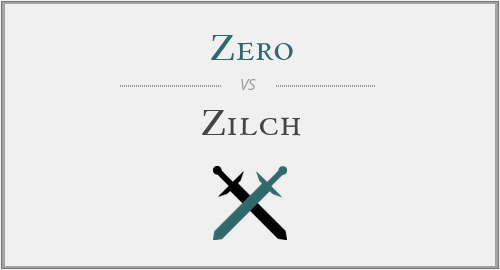Zero vs. Zilch
Unlike most confusing word pairs in English, where the main differences are sourced in the meanings of the words, things are different for “zero” and “zilch”. The key and major difference between these two words is actually reflected in their syntactical/grammatical function, rather than in their significance.
Both “zero” and “zilch” refer to nullity, to nothing. But whilst one is a number, the other one is a pronoun. And if you want to understand this distinction further, keep reading the examples and more details explanations below!
When do we use “zero”?
“Zero” is always used as a number, and never anything else. Therefore, we should only use “zero” when counting nullity, as a number. In other words, “zero” defines the number corresponding to the symbol “0”, the number before 1.
Example: Add another zero to their salaries if you want to motivate them. – “zero” is the number 0.
When do we use “zilch”?

“Zilch”, on the other hand, functions as a pronoun and as a determiner. In the first case, the pronoun “zilch” is a perfect synonym for “nothing”; whereas in the last case, the determiner “zilch” is a replacement for “no”, or for “not any”. Confused? We’ll clarify these two meanings in just a few seconds – just read the examples provided below!
Example 1: I know absolutely zilch about nutrition. – as a pronoun, “zilch” means “nothing”.
Example 2: The author has zilch knowledge about his readers. – as a determiner, “zilch” replaces “not any”, or “no”.
Conclusion
Although it may seem overwhelming at first sight, it’s quite easy to remember what “zero” and “zilch” mean, especially as there are no complicated or complex definitions behind these words. “Zero” is the number 0, or the written form of the symbol. And “zilch” is a pronoun and determiner reflecting nullity, nothing, or not any. In both cases, the common concept is the existence of nothing, nullity or absence.
Still, if you find it hard to remember what each word stands for, and if you keep confusing their meanings, we’ve got a pretty simple trick for you to help you out. Just check out the spelling of the words, and you’ll quickly notice that you are able to find the symbol “o” (extremely similar with “0”) in “zero”, but not in “zilch”, which gives you the best clue that “zero” is the number for the symbol “0”, whereas “zilch” (which contains an “i”, just like “nothing” and unlike “zero”) means “nothing”.




Have a discussion about this article with the community:
Report Comment
We're doing our best to make sure our content is useful, accurate and safe.
If by any chance you spot an inappropriate comment while navigating through our website please use this form to let us know, and we'll take care of it shortly.
Attachment
You need to be logged in to favorite.
Log In